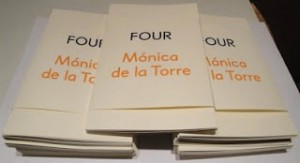
I think I first met Mónica de la Torre at a reading she gave with Eleni Sikelianos in the late ’90s or early ’00s at a gallery in Williamsburg, Brooklyn. The close friend I mentioned in a previous post knew her when they both lived in Mexico City (where de la Torre was born), and he encouraged me to introduce myself and say hello. At the time, she was working for the Mexican Cultural Institute of New York, though these days she’s the senior editor of BOMB magazine where she helps commission a wide range of interviews and reviews across artistic disciplines, along with editing its literary supplement, First Proof. She’s become one of my favorite people to spend time with navigating New York City’s various artistic and cultural worlds.
Her polymathic curiosity carries over into her own work as a poet (her two previous full-length books in English are Talk Shows and Public Domain), translator (of Mexican and South American poetry), editor (of Reversible Monuments: Contemporary Mexican Poetry), art critic (for ARTnews, among other places), and scholar (of Latin American avant-garde poetry). And it appears most clearly in her new book, FOUR, which combines four long poems and serial poems by leaving them separate: that is, instead of fusing them into a perfect-bound book, FOUR features individual, stapled chapbooks with a title, acknowledgments, and copyright supplement, all collected together with a wraparound sleeve.
This allows de la Torre to showcase her poetic range: from disjunctive prose (“Lines to Undo Linearity”), to appropriation-based verse (“Shift”), to autobiographically driven poems (“Photos While U Wait”), to elegy (“Mariposa Negra”). Each reveals subjects, subject matter, and the relationships they form with themselves and others to be makeshift, transitory, at times even randomly cobbled together. At best, the self is an intermixing; at worst, a splitting. It isn't a coincidence that this gets expressed most explicitly in FOUR with a quotation from someone else: “My voice is most essentially itself and my own in the ways in which it parts or passes from me (Steven Connor).” Throughout FOUR this is less stated than manifested in its alternate poetic forms: “A line of thought keeps branching off in multiple directions no matter how much one tries to contain it.” But de la Torre’s poetry makes this living with uncertainty less a burden than a kind of pleasure. This is playful, self(’s)-deflating work, while confident in its willingness to continue experimenting and taking risks.
Alan Gilbert is the author of the poetry collections The Everyday Life of Design (Studio, 2020), The...
Read Full Biography

